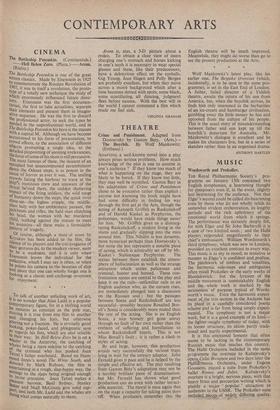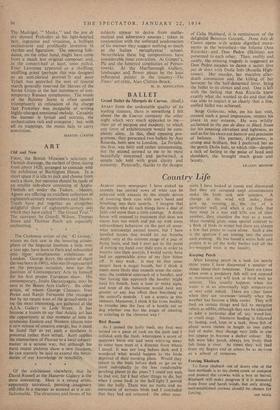MUSIC
Wordsworth and Prokoflev.
THE Royal Philharmonic Society's pro- gramme on January 13th contained two English symphonies, a heartening thought for composers even if, in the event, slightly less heartening for the audience. Not that Elgar's second could be called dis-heartening even by those who do not wholly relish its somewhat strident orchestration, its lengthy periods and the rich upholstery of the emotional world from which it springs. The performance was certainly deeply felt, for with Elga'r and Sir John Barbirolli it is a case of two kindred souls ; and the Halle players responded magnificently to their chief's enthusiasm. William Wordsworth's third symphony, which was new to London, provided an excellent contrast in every way. This music is as shy in mood, as tentative in manner as Elgar's is confident and profuse. The patchwork of timbres and tonalities, the harmonic side-steps and ambiguities often recall Prokofiev or the early works of Shostakovich : but the lyricism of the middle movement is unmistakably English and the whole work is marked by the seriousness of purpose typical of Words- worth's music. Even the harmonic experi- ment of the trio section in the Andante has its place in a carefully considered poetic scheme and is far from being simply experi- mental. The symphony is not a major work, but it is a good example of its kind— the lighter-weight symphony of today, with its looser structure, its idiom partly tradi- tional and partly experimental. It is this emotional honesty that often seems to be lacking in the contemporary Russian music that reaches this country. The Halle Orchestra included in the same programme the overture to Kabalevsky's opera Colas Bretignan,and two days later the Philharmonia Orchestra, under Eugene Goossens, played a suite from Prokofiev's ballet Romeo and Juliet. Kabalevsky 's overture is a bright, nervous piece, with that heavy brass and percussion writing which is plainly a major ' popular ' attraction to audiences in the USSR. The Prokofiev suite includ,eci pieces of wi4ely differing quality. The Madrigal, " Masks,' and the pas de dix showed Prokofiev at his light-hearted best, ingenious and vivacious, a brilliant orchestrator and prolifically inventive in rhythm and figuration. The opening folk- dance, on the other hand, might have come from a much less original composer and, in the concert-hall at least, soon palled. Friar Lawrence appeared as a shuffling. snuffling priest (perhaps this was designed as an anti-clerical portrait ?) and poor Tybalt was accorded the sort of funeral march generally reserved for Heroes of the Soviet Union in the last movement of con- temporary Russian symphonies. The music of the Balcony Scene is often quoted triumphantly in refutation of the charge that Prokofiev was incapable of writing highly-charged emotional melody. Certainly the manner is lyrical and ecstatic, the orchestration rich and evocative but, with all its trappings, the music fails to carry conviction.
MARTIN COOPER



































 Previous page
Previous page